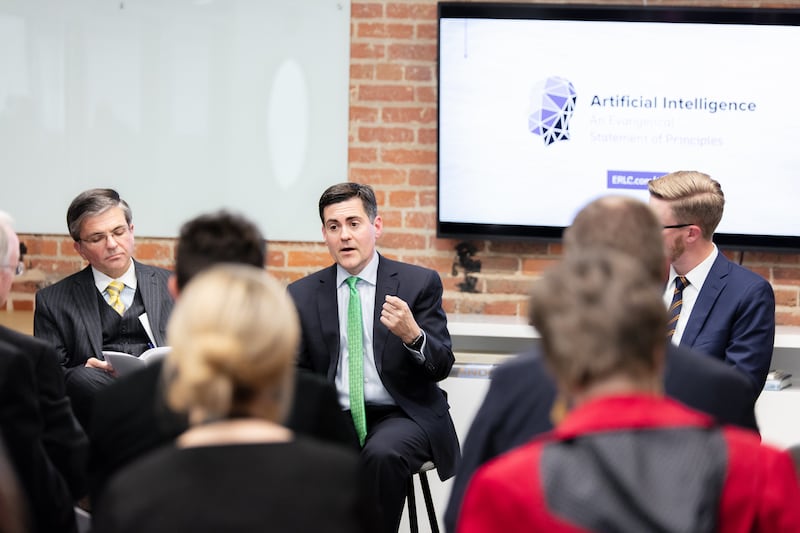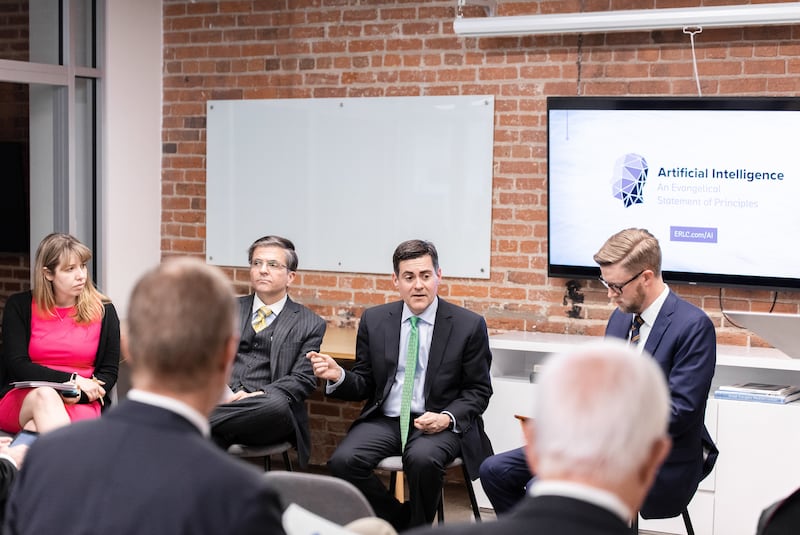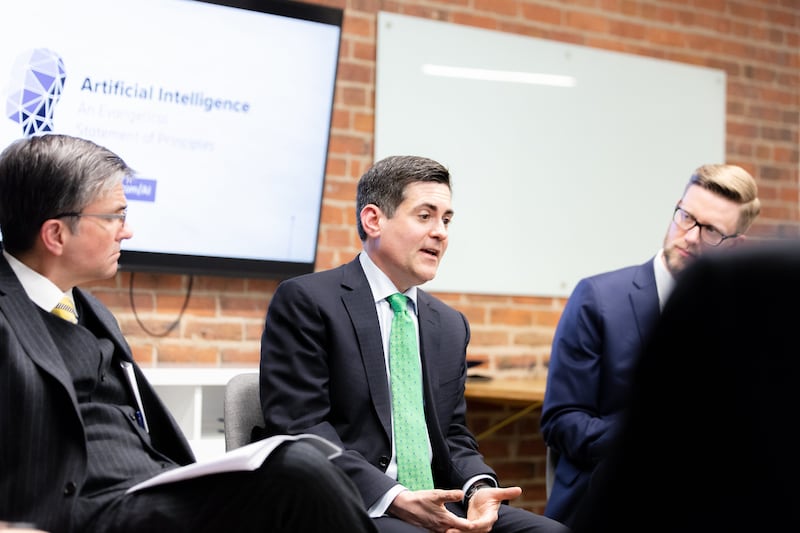SALT LAKE CITY — Russell Moore has been asking tough questions about technology for years. Who should control human cloning? What's the definition of a human? Are sex robots sinful?
The problem is people think he's joking.
"Whenever I raise some of the most pressing questions, they seem, to most people, to be like science fiction," said Moore, president of the Ethics & Religious Liberty Commission, the public policy arm of the Southern Baptist Convention, America's most prominent evangelical Christian denomination.
He doesn't mean the questions that way. To Moore, sex robots, artificial intelligence and other technological developments are serious business.
"This is what’s been keeping me awake at night for years," he said.
So he's trading questions for statements.
This week, Moore's organization released "Artificial Intelligence: An Evangelical Statement of Principles," a declaration he hopes will help guide humanity through overwhelming technological and scientific change. Developed through dialogue with medical, legal, political, technological and ethical experts, it urges caution as well as creativity.
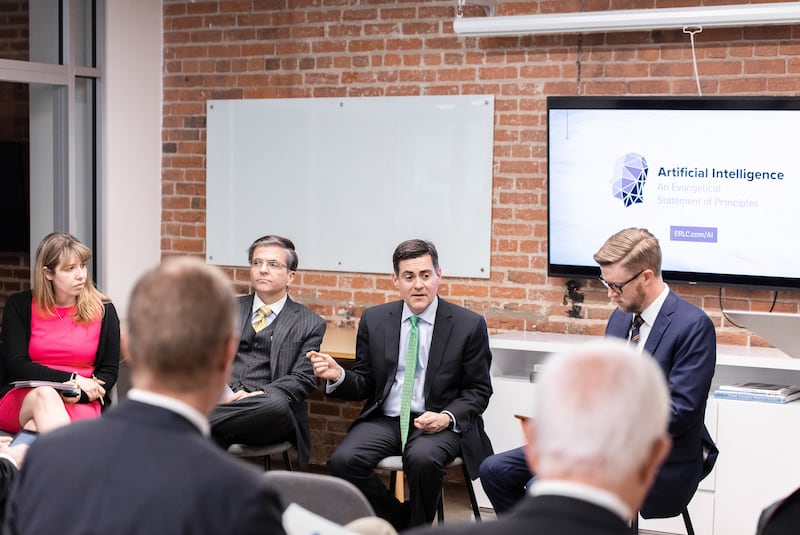
"As part of our God-given creative nature, human beings should develop and harness technology in ways that lead to greater flourishing and the alleviation of human suffering," the document explains.
The statement is designed to spark better conversations in homes, churches, Silicon Valley offices and the halls of Congress, Moore said. Too often, ethical concerns emerge long after new technologies are released.
"We're moving toward vast technological change. If there is not consideration beforehand of the spiritual and moral implications, we're not going to be ready," he said.
And we can't count on Silicon Valley developers to pump the brakes themselves, said Ronald Cole-Turner, a theology and ethics professor at Pittsburgh Theological Seminary.
"Nobody ever made money gambling on slowness in Silicon Valley," he said.
'OK, Google'
The problem with telling a story about your virtual assistant is she's always listening. Moore realized that recently as he tried to avoid saying "Alexa," the name used to get an Amazon Echo's attention, so as not to wake his device while telling a story about it.
"If you had told me a few years ago I’d be spelling the name of a robot so I wouldn’t wake her up, that would have seemed bizarre, ridiculous and creepy," Moore said.
That's what makes debating artificial intelligence and other technological advancements difficult, he noted. You feel a bit absurd brainstorming the ethical ramifications of replacing factory workers with robots or baptizing cyborgs, even if the conversation might be very helpful in the future.
"The way technology works is it seems to be ridiculous until it’s ubiquitous," Moore said. And once it's ubiquitous, you've lost your chance to rein it in.
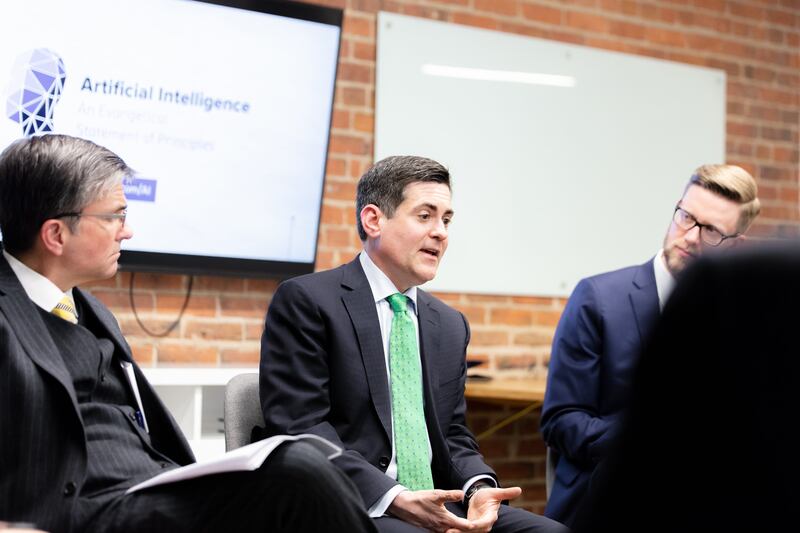
That was the case for online pornography, he noted. Evangelical Christians didn't see it coming, so they were still debating access to theaters and magazines while the pornography industry shifted to the web.
Evangelicals "didn't recognize that right around the corner was a digital revolution," Moore said.
Today, people may recognize that virtual assistants or digital navigation systems are changing their habits, but they rarely see how technological advancements stand to reshape entire industries, Cole-Turner said. Artificial intelligence shifts how countries go to war, fight disease, manufacture products and approach any number of other projects.
"It's affecting just about everything already, and it will continue to affect wider and wider terrains of human existence," Cole-Turner said.
And that's theologically significant, he added. Artificial intelligence is like a new type of creation, made by humans but potentially more powerful and advanced than them.
"God is supreme intelligence. Human beings are embodied intelligence. But artificial intelligence? Where does that fit?" Cole-Turner said.
Someday, computer systems and robots could easily pass as human. Clones of your brother or daughter or boss could be walking around. People need to sort out what that will mean for humanity, Moore said.
"All Christians (should) start really thinking through what it means to be human, the proper goals and limits of technology and how we are being changed unintentionally by the technology we have now," he said.
New statement
The new statement on artificial intelligence, which is signed by nearly 70 evangelical Christian leaders, aims to inspire that kind of reflection, Moore said. Using biblical citations and theological language, it casts a vision of a better path forward.
"We desire to equip the church to proactively engage the field of (artificial intelligence), rather than responding to these issues after they have already affected our communities," reads the statement, which consists of a preamble and 12 articles, each two paragraphs long.
Just because we should do something doesn't mean we don't have a long process of sorting through how to do it well. – Russell Moore
Although it does not explore specific ethical dilemmas, the document outlines key aspects of technological advancement in need of Christians' attention. It urges readers to think about how artificial intelligence affects privacy, sexuality, work and medicine, as well as the temptation to treat technology like a God.
"While technology can be created with a moral use in view, it is not a moral agent. Humans alone bear the responsibility for moral decision making," the statement explains.
Moore hopes the document will do more than inspire better conversations in faith communities. He wants it to lead to better relationships between religious leaders and technology developers and to remind lawmakers that they, too, should be paying close attention to what's happening in Silicon Valley.
"Just because we should do something doesn't mean we don't have a long process of sorting through how to do it well," he said.
Micah Redding, executive director of the Christian Transhumanist Association, a group for people who believe we’re called by God to use technology to transform human life, said he's glad that the statement celebrates possibilities created by artificial intelligence even as it advocates for better ethical debates.
It's wrong to be so consumed by anxiety that you try to shut down technological advancement all together, he said.
"Ultimately, you have to meet concerns with hopefulness," Redding said.
The statement tries to find a middle ground between overwhelming fear and unbridled optimism, Moore noted.
"What we’re trying to work against is both reflexive negativity against any technology but also a reflexive naiveté that sees all technology as morally neutral," he said.
Potential reception
Cole-Turner celebrates the work that went into the new statement, arguing that faith groups can and should play a bigger role in technological and scientific advancements. However, he's still a bit skeptical about how Silicon Valley insiders will receive this message.
"If I were an IT guy, I’d say, 'Really? Do you expect me to take you seriously?'" he said.
Religious belief is often seen as hostile to science, Cole-Turner added. Some evangelical Christians reject research on climate change and vaccines.
Similarly, Redding believes it will take more than a statement to establish stronger connections between the technology industry and religious organizations. People of faith need to develop a track record of thoughtful engagement and acknowledge what they don't know or understand.
"In order to be able to offer ethical guidance and critique the development of new technologies, you have to be involved in conversations and willing to accept challenges from other people involved," Redding said. Christians won’t be welcomed if they’re merely "bystanders with moral opinions."
What frightens me most is not the technology, but our human incapacity to reflect critically and to guide its development. – Ronald Cole-Turner, a theology and ethics professor at Pittsburgh Theological Seminary
Artificial intelligence experts do seem interested in outside input on the ethics of their work, he added. But it has to be the right kind of input.
"I don’t think many secular people (working on artificial intelligence) will be interested in just our opinions of what the Bible has to say. But they will be interested if we can offer a cohesive ethical vision that’s positive and good for the whole world," Redding said.
Moore is hopeful about the kinds of conversations that will be possible moving forward. As he's researched artificial intelligence and helped prepare the new statement, he's been pleased with the technology industry's response.
"The technology industry, including unbelievers, have welcomed moral conversations around these topics in ways that I don’t think most people would expect," Moore said.
Even if Elon Musk or Mark Zuckerberg don't meet with religious leaders anytime soon, the new statement is a step in the right direction, Cole-Turner said. The more people are paying attention to what Facebook, Amazon and other companies are up to, the better.
"What frightens me most is not the technology, but our human incapacity to reflect critically and to guide its development," he said.

